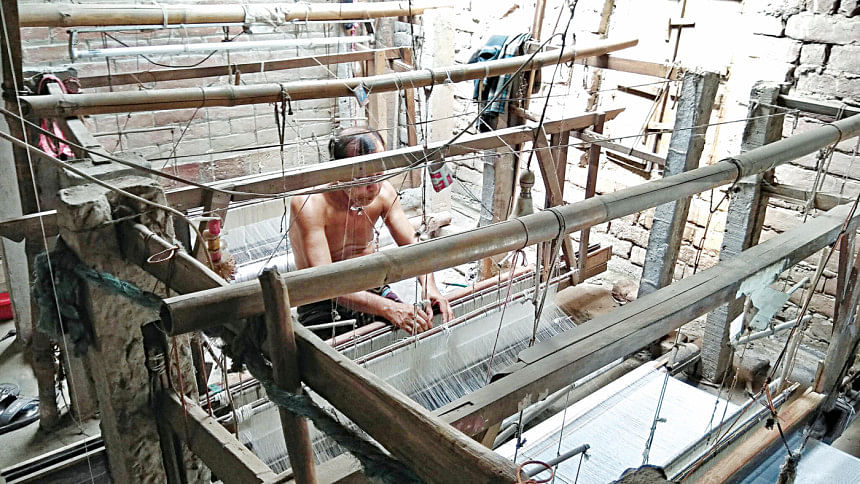Silk business faces tough times

Life for weavers and workers of handloom silk clothing in Chapainawabganj has taken a rough turn as sales of these dearer garments dipped due to the pandemic.
Since the countrywide shutdown began on March 25, the weavers in different villages of the district's Shibganj and Sadar upazilas have halted their operations, leaving hundreds of handloom workers temporarily jobless.
"I usually weave silk cloths and sarees at my four handlooms and supply the items to Rajshahi, Dhaka and other districts. But the business stopped after the government declared a countrywide shutdown for Covid-19 and I suspended production since then," said Bibhuti Bhusan Das of Horinagar village in Shibganj upazila.
"Even with the shutdown eased now, buyers are not showing interest in purchasing our products. So, I have not started production," he told this correspondent, who visited Horinagar last week.
Monojit Chandra Singha, owner of 15 handlooms in the Sadar upazila's Laharpur village, said, "Chapainawabganj is famous for traditional silk fabric, popularly known as Rajshahi silk."
Monojit's stock of silk clothing worth Tk 15 lakh has remained unsold since the shutdown.
Another handloom owner Samir Chandra Das of the same village also has unsold stock worth around Tk 7 lakh.
Owner of six handlooms, Samir has been running this ancestral business for a long time and never faced such a crisis. He said until now buyers have always shown interest in their product.
According to handloom owners, the silk clothing business peaks during Pahela Boishakh and the two Muslim festivals of Eid-ul-Fitre and Eid-ul-Azha.
Already two festivals have gone and the other is only a few months away but still there's no sign of buyers, weavers lamented.
Many owners like Monojit and Samir, who took loans from banks, NGOs, private moneylenders and bought the yarns on credit, are now worried about timely repayment.
The workers are in worse condition. Their daily earning of Tk 250 to Tk 350 from weaving clothes has vanished since the shutdown.
Probol Chandra Singha, a handloom worker of Laharpur village, has to depend on relief rice and loans from his employer to survive the pandemic days.
Another handloom worker Shafiqul Islam of Nayalavanga village in Shibganj upazila had to work as farm hand during the Boro harvest to feed his family of four.
Niranjon Das, Secretary of Baroghoria Weavers Association, said there are over 1,200 handlooms at Horinagar, Kansat, Biswanathpur and Chaturpur villages of Shibganj, and Laharpur and Bohorom villages of Sadar upazila.
Though on April 5, Prime Minister Sheikh Hasina unveiled a Tk 20,000 crore stimulus package for cottage, micro, small and medium enterprises, Niranjon said weavers in the area have not received any help from the government.
Mohammad Azad Hossain, assistant general manager of Bangladesh Small and Cottage Industries Corporation (BSCIC), told this correspondent that a 17-member committee was formed on June 9 for preparing a list of small business owners, who will be able to avail soft loans.
The committee, led by the deputy commissioner of Chapainawabganj, includes bank officials as well as representatives of small entrepreneurs and Chapainawabganj Chamber of Commerce.
Weavers will also get loans under this list of affected businesses, Azad added.
However, he could not specify the loan amount or the number of businesses that will be covered.

 For all latest news, follow The Daily Star's Google News channel.
For all latest news, follow The Daily Star's Google News channel. 



Comments